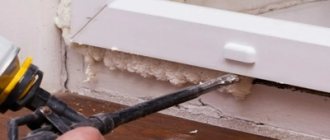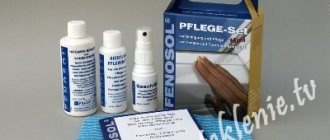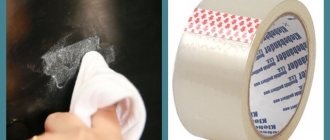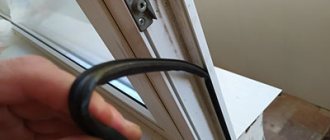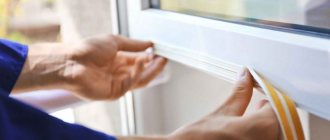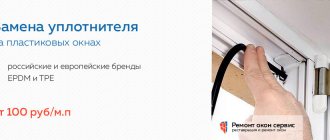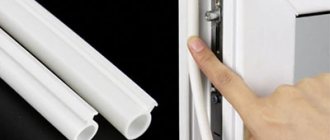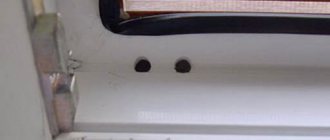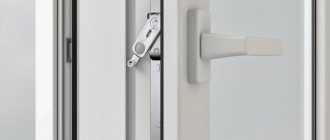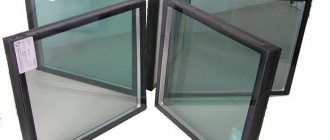This element, together with the PVC frame and glass block, ensures the energy efficiency of the window, but at the same time carries a significant load during the compression/release cycle.
According to regulatory documents, the seal must withstand at least 300,000 such cycles without destruction over its entire service life. In order to ensure such characteristics, immediately after installing the insulation on the window structure, and then 2 times a year, it is lubricated with a special compound called lubricant.
Can window seals be lubricated?
Despite the long service life that manufacturers of window seals set for their products, in order for them to work as expected, they will need to carry out periodic maintenance at least 2 times a year , which consists of cleaning the product from dirt and dust, and then lubricating their surfaces with special solutions. Treating the surface of the seal with lubricant improves its quality parameters; it becomes softer and more flexible.
When the surface of the seal is treated with lubricant, a continuous thin copolymer layer is formed, protecting it from the influence of atmospheric water and other negative external factors. To perform protective functions, the lubricant must have the following characteristics :
Available in the form of a viscous translucent liquid, gel or spray.- High adhesion, the lubricant must interact firmly with the seal of the type for which it is intended.
- They do not contribute to chemical deformation of the structure of the material, and do not have the slightest other negative effect on it.
- Bioinertness, the material cannot be a breeding ground for bacteria and microorganisms.
- The highest dielectric and antistatic characteristics, the layer should not be electrically conductive.
- It must have high hydrophobicity, displacing water from the connecting seams, thereby protecting the metal parts of the frame and fittings from corrosion processes.
- High elasticity.
- Stability, not susceptible to oxidation.
- Good anti-friction qualities.
- Environmental Safety.
- Longest possible evaporation period.
- Fire resistance.
- Resistant to salty, acidic and alkaline solutions.
- Ability to work in the temperature range from -40°C to +50°C.
Every time the PVC doors are opened, dust from the street settles on the seal. Over time, the degree of clogging increases, and eventually it loses its elasticity, making the opening/closing process difficult.
If measures are not taken for a long time, an abrasive effect will occur on the surface, which leads to irreparable consequences with loss of the element’s functionality. If the rubber product has completely worn out and is no longer able to protect the PVC window, it will need to be replaced. Such a seal cannot be restored.
What is it for?
Cleaning and lubrication during sealing helps protect against premature failure of the seal. In order to increase the service life of such rubber window products, manufacturers protect it with the thinnest film. It must be maintained by periodically lubricating it with special solutions.
Periodic treatment of rubber products with lubricant is the responsibility of the owner of the PVC window, which is specified in the manufacturer’s instructions.
By external signs you can determine when the window seal requires lubrication:
the occurrence of extraneous sounds during operation of the PVC sash;- the presence of dust on the surface of the product;
- decreased ductility and sticking of rubber seals to the frame;
- difficulty opening the sash;
- important structural components are worn out due to increased pollution from street dust;
- jamming of the locking mechanism;
- violation of sealing;
- the appearance of gaps.
If you do not lubricate rubber window products for 3-4 years, you will have to replace important mechanical components of the PVC window, for example, hinges, which will cost the user much more than lubricating the seals.
especially important to carry out this procedure before the start of the heating season so that in winter there are no problems with opening the sash. During this period of the year, at sub-zero temperatures, the structure of the seal becomes rigid and elasticity decreases, which leads to the appearance of cracks.
A lubricant specifically formulated for window seals makes them softer and prevents them from freezing. Therefore, when choosing the type of lubricant, the user must pay attention to the possibility of its operation at sub-zero temperatures.
The most acceptable is a special polymer silicone lubricant with a hydrocarbon composition. It qualitatively protects rubber seals from freezing to the frame and cracking, perfects sealing, heat and protection, thereby helping to preserve heat in the premises.
Description
The rubber seal is an important component of the window system. Its task is to create excellent tightness of the plastic double-glazed window. It is its functionality that will determine how well the window structure can cope with extraneous sound, maintain temperature conditions and protect the house from the penetration of unpleasant street odors.
The main advantages of this product include a high level of moisture and air impassability, as well as high resistance to the influence of sunlight, precipitation and temperature changes. Thus, the rubber seal has a long service life and low price. Even under the worst weather conditions, such products will not crack. In order not to suffer with windows later, it is important to understand what types of double-glazed windows exist for plastic windows.
For the manufacture of rubber seals, oil- and acid-resistant rubber is used. It can be food grade or high-tech quality. Its composition contains modifiers, thanks to which the material acquires increased durability even under the most severe conditions. More similar elements can be obtained from porous rubber. It has increased thermal insulation abilities. As a rule, such seals are self-adhesive, making installation easier.
But what kind of seal there is for interior doors, and how to install it correctly and in what case the installation takes place, this information will help you understand.
On video, a rubber seal for plastic windows:
Frequency of the procedure
According to GOST requirements for window seals, they must be produced with high protective characteristics and elasticity. Therefore, every manufacturer of PVC windows qualitatively treats the seals with lubricant at the factory. In practice, this quality of treatment is practically enough for 2 years, after which it is necessary to carry out the procedure for replacing it, and then repeat it regularly.
The standard lubrication cycle usually includes 2 times a year before the start of the summer season, in order to protect products from high temperatures and ultraviolet rays, and in the fall, before the onset of winter frosts. This makes it possible to guarantee long-term protection and increase the wear resistance of the window structure.
The actual lubrication frequency is set based on the actual load on the seals. In this case, the most negative factors are considered to be: grease and dust deposits, sand and moisture, as well as abrasives and chemicals. If such a window is located near industrial facilities or near roads, their owners will have to lubricate the seals more often.
If, between the maintenance procedures established by the standards, the owner of a PVC window notices negative signs in the behavior of the seals, then it is necessary to carry out lubrication ahead of schedule.
What are the dangers of freezing car doors?
In winter, rubber car door seals freeze to the metal due to the presence of moisture on them. At night, when the car cools down, the water turns into ice and grabs the doors around the perimeter.
In half the cases, after several attempts, you manage to get into the salon. However, it also happens that to open the doors you have to use various tricks: for example, pour hot water over them along the contour. This is inconvenient and harmful to the paintwork. Due to temperature changes, it becomes covered with microcracks, into which water and dirt subsequently penetrate. In addition, the water that gets on the seals will then freeze again, and you will have to start all over again.
Using brute force to open a car is unwise. Vigorous tugging on the handles sometimes ends in their breaking. In addition, if you apply excessive force, you can damage the rubber seals by simply tearing them out.
The most gentle option for the car is to wait for the thaw. But it doesn't always fit. The second way to get into the car is to tow it into a warm box so that the ice melts. However, again, not everyone has such a room or it is too expensive.
Naturally, it is easier to prevent a problem than to solve it. The simplest and most effective method of combating freezing of rubber door seals is their preventive lubrication.
What lubricants are suitable?
The PVC window manufacturer must provide the buyer with detailed instructions on the procedure for lubricating seals and acceptable materials. If you install the seals yourself, you will need to select the type of lubricant.
It directly depends on the sealant material and the processing season. The retail network has a sufficient variety of high-quality professional lubricants, such as :
Bosny;- Eltrans;
- Silicot;
- Verylube.
In addition, the user can treat the surfaces of the seal using substitute materials that are used in everyday life.
When selecting a lubricant, you need to pay attention to some important criteria :
- The cost should not be cheap, this indicates its poor quality.
- Quality is confirmed by certificates, so it is better to take certified material.
- Composition option: liquid, gel or aerosol. They are chosen depending on the place of treatment; if it is difficult to access, then it is better to take an aerosol format of lubricant, and if not, then a gel one.
- Pay attention to the technical characteristics; the material must have a temperature range corresponding to the climate, the area where the window is installed, and also be suitable in terms of the chemical composition of the sealant material.
Professional products
Serious manufacturers of PVC window systems KBE, FENOFLEX, Fenosol, Edel Weiss and Robitex took care of the buyers of PVC windows and released special professional kits for their care, which include cleaning products and lubricant for seals.
Such professional lubricants maintain the elasticity of rubber products, inhibit their wear by 25%, and increase resistance to unfavorable low and high temperatures.
The advantages of such compositions are:
- complete chemical consistency with the texture of plastic and rubber;
- environmental and biological safety, which allows them to be used in residential premises.
The disadvantage is the relatively high cost , the kit costs the buyer more than 500 rubles, it contains a 50 ml tube of lubricant, which is enough for 2-3 years of use for 1 window.
Silicone
For those users who have PVC window systems from other manufacturers installed, experts advise using universal silicone lubricants.
Advantages of universal silicone grease for PVC window seals:
- optimal viscosity, due to which it is applied to the surface evenly;
- protection of the seal from moisture and freezing;
- delays wear and tear;
- colorless and odorless, therefore suitable for seals of different colors;
- fire hazardous inertness;
- chemical inertness;
- environmental protection;
- difficult to dissolve in water, even hot;
- high temperature resistance - from - 50 to + 220 C;
- large selection, low cost and convenient packaging, with a volume sufficient for processing for 2-3 years.
When choosing silicone lubricant, you must not confuse it with silicone lubricant for metal parts; such a composition can completely destroy the structure of the insulation.
Some users include the following disadvantages of silicone grease
- High cost, although this is more evident when purchasing sets of brand names.
- Users complain that if such a lubricant is accidentally spilled, it is impossible to wash off the silicone from the surface. And this is true, since it belongs to insoluble compounds, which, in general, is one of its main advantages. Therefore, you need to work with it very carefully, avoiding spills.
WD-40
Today, the most popular building material for window seals on the Russian market is WD-40 lubricant. This composition has a famous history; it was developed as a protective anti-corrosion material for the lining of space rockets, and later found many uses for it in everyday life.
The basis of WD-40 is formed by mineral oil, which covers the surface with a waterproofing film and various hydrocarbons that reduce the viscosity of the original composition. In the retail chain you can purchase gel and aerosol formulations of this modification of the lubricant. Users prefer the aerosol one, which is easy to apply over the surface of the seal.
Benefits of using WD-40 lubricant for window seals:
- Highest insight performance;
- creation of a protective film preventing the penetration of moisture;
- increasing the period of use of window seals.
When working with WD-40, you need to be careful and prevent the substance from getting on human mucous membranes, and its contact with polystyrene and polycarbonate is not recommended, since it is completely capable of destroying their structure.
Traditional methods
The most popular folk remedies that are used in everyday life to lubricate window seals are glycerin and cosmetic petroleum jelly.
Despite the fact that chemists classify glycerin as a group of alcohols, nevertheless, unlike other alcohols, it is absolutely not dangerous for PVC.
Advantages of folk remedies glycerin and petroleum jelly when used as a lubricant for window seals:
softens the seal material, making it more elastic;- creates a protective film;
- low cost;
- availability on the market;
- low solidification temperature;
- highest hygroscopic properties.
The disadvantages include its rapid solubility , due to which it is washed off with water, it needs to be applied more often than silicone grease, as well as its low frost resistance - not lower than 25 C and low heat resistance not higher than + 27 C.
Some tips for cleaning windows
- For those who want to keep their apartment as warm as possible, experts advise installing energy-saving film on the windows. Thanks to its structure, it reflects rays in the summer, protecting the room from overheating, and in winter it retains heat by reflecting the rays inside. Energy-saving packages on windows can significantly save on heating costs in winter and on air conditioning in summer.
- Always use rubber gloves when cleaning window glass.
- We advise you to ventilate the room well after cleaning, especially if you used ammonia or vinegar.
- Be careful when cleaning to avoid getting detergents in your eyes.
- On high floors, be sure to follow safety precautions.
We follow safety rules.
Any person can provide proper care for plastic windows with their own hands. With proper handling, the product can last about 40 years. PVC windows will provide an optimal microclimate in the house and protect from cold and wind.
Lubrication Tools
For the process of applying lubricant itself, you do not need a tool as such, only a clean rag and a bottle of lubricant. However, this work is carried out as part of the preparation of PVC windows for the winter or summer season, which includes preventive maintenance of window fittings, cleaning and adjustment of window elements.
Therefore, in preparation for such complex work, you will need to purchase the following tools and consumables :
- electric screwdriver with attachments;
- screwdriver with bits;
- main window hex key;
- hammer with rubber tip;
- clean rags;
- lubricant suitable for the type of seal.
Step-by-step process instructions
To carry out lubrication work on PVC window seals, select a warm, dry day, usually in mid-spring or autumn. Having opened the window sash, determine the location of the seal: sash - internal perimeter; double-glazed window - internal/external perimeter and frame perimeter.
Regardless of the type of lubricant chosen, the procedure is quite simple and looks like this :
Clean the surface of the seal with a clean damp cloth soaked in a soap solution.- After cleaning it dry with a dry cloth, wipe the surface of the seal.
- Lubricate the rubber product around the entire perimeter on all sides.
- Glycerin and petroleum jelly are applied carefully with a brush.
- Liquid lubricants are applied with a cotton pad.
- Wait until the composition has completely dried and thus created a dense protective film, after which they begin to check and adjust the window fittings.
- Close the window.
Proper processing of rubber elements
Buying the right product is not enough - it is important to know the key aspects of caring for rubber seals. The user should follow the tips below:
- You need to take care of PVC rubber window elements twice a year - before winter and summer;
- first the seal is cleaned - wiped with a damp cloth, sponge, then with a dry cloth;
- if the seal has petals, they are lubricated first, then the rubber on the outside;
- when using viscous products, use brushes of different thicknesses;
- Having lubricated the seal, you need to let it dry for about an hour, after which the window sashes can be closed.
There is no easier way to extend the life of PVC windows than to regularly lubricate the rubber seals with high-quality alcohol-free solutions. The user, spending only 20 minutes annually on caring for the elastic elements, will increase the durability of the plastic structure several times.
Possible mistakes
Despite the fact that the operation of lubricating the seal is extremely simple, many owners of PVC windows make significant mistakes, which leads not only to premature failure of the seal itself, but also to the destruction of important structural window mechanisms. In addition, such a window will begin to freeze, and there will be drafts in the room, so you can forget about the energy-efficient merits of PVC windows.
The most common mistake made by users is that they do not read the operating instructions for PVC windows and do not use the sealant lubricant specified by the manufacturer for their window structures.
Possible mistakes that performers make when applying lubricant to the PVC window seal:
- Instead of silicone grease for the seal, silicone grease for metal products is applied, as a result, the structure of the rubber product is damaged;
- The surface of the seal has not been cleaned;
- lubricant is applied to a wet surface;
- the application of lubricant was carried out poorly, the PVC surfaces of the frame and sash were damaged;
- The window unit was not adjusted after performing the technological procedures.
How to properly adjust plastic windows
After several years of using the product, the owner may encounter several problems:
- there was air leaking from under the seal;
- the handle turns with effort;
- The window does not close tightly.
All these breakdowns can be easily solved by adjusting the product: you just need to tighten a few screws. Tools you will need are pliers, a hex wrench, a spatula, a flathead and a Phillips screwdriver.
All possible adjustments.
- If the sash is skewed, you need to loosen or tighten the upper hinge of the sash. When turned clockwise, it rises, and when turned counterclockwise, it lowers.
- If there is a problem with drafts, it is necessary to adjust the sash pressure. To do this, you need to act on the eccentric system, which is located on the end of the window. For uniform pressing, it is recommended to adjust all mechanisms equally.
Adjustment.
Average price for material
The cost of lubricating compositions for window seals depends on the manufacturer’s brand, the type of composition: liquid, gel or aerosol, and the trade markup.
Average price for lubricants for window seals in the Russian retail chain:
WD-40, quick-drying, 200 ml - 366 rub.- Grass Silicon silicone, aerosol, 400 ml - 250 rub.
- BiBip BB-325 professional, aerosol, 520 ml - 210 rub.
- SILICOT, universal silicone, gel, 30 g - 300 rub.
- LIQUI MOLY Pro-Line Silicone-Spray, colorless silicone aerosol, 0.4 l — 779 rub.
- Goodyear GY000701, silicone, aerosol, 400 ml - 370 rub.
- ASTROhim, silicone, aerosol, 520 ml - 250 rub.
- FILL INN FL025 silicone, aerosol, 335 ml - 250 rub.
- PMS-100, silicone, oil, 100 ml - 250 rub.
- REXANT 09-3921, silicone, oil, 100 ml - 1200 rub.
- Laurel Ln1543, silicone, aerosol, 400 ml - 770 rub.
- FELIX, silicone, aerosol, 400 ml - 250 rub.
